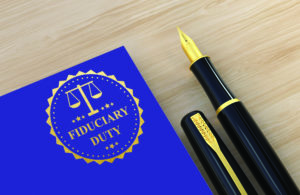 By Christopher Candon
By Christopher Candon
In the wake of the COVID-19 pandemic and recent economic instability, companies are being forced to assess their financial health and stability. While most will weather the storm, many companies may find the past few years have overwhelmed their ability to continue operating as they once had, and even a return to “normal” will not be a sustainable business model. If a company finds itself facing insolvency, or approaching it, its directors and officers must continue to fulfill their fiduciary duties. However, directors and officers should take care to identify to whom these duties are owed as the financial health of the company changes over time. How these obligations function during solvency, insolvency, and the “zone of insolvency” requires careful consideration.
During the normal course of business, directors and officers (D&O) owe fiduciary duties to the company. These duties include the duty of care and the duty of loyalty. Within these duties there is also the duty of good faith.
a. The duty of care requires D&O to use that amount of care which ordinarily careful and prudent persons would use in similar circumstances, and to consider all material information reasonably available. In re Walt Disney Co. Deriv. Litig., 907 A.2d 693, 749 (Del. Ch. 2005); See also Smith v. Van Gorkom, 488 A.2d 858 (Del. 1985); Robert Clark, Corporate Law Section 3.4, 123 (Aspen Publishers, Inc. 1986).
b. The duty of loyalty prohibits the fiduciaries from taking advantage of their beneficiaries by means of fraudulent or unfair transactions. Robert Clark, Section 4.1 at 141. See also Lewis v. Vogelstein, 699 A.2d 327 (Del. Ch. 327); Weinberger v. UOP, Inc., 457 A.2d 701 (Del. 1983). Directors must be in a position to base their decisions on the merits of the issues rather than being governed by extraneous considerations or influences, including their own personal interests. Directors should be disinterested and independent in their decision making.
c. The duty of good faith requires that directors act in what they honestly believe to be in the corporation’s best interest rather than any other interest another director might have.
A. Business Judgment Rule: Liability Considerations

Generally speaking, D&O are protected from decisions that go awry by the “business judgment rule.” Under that rule, a director or officer, in making an informed decision in good faith with a rational business purpose, will not be second-guessed by a court if the decision turns out badly. D&O should take care to review all reasonably available materials and information concerning the subject matter of any decision, and the board should actively and critically discuss and evaluate all decisions. Courts generally presume that all directors are acting within the business judgment rule; however, this presumption can be rebutted by a plaintiff in court, which then shifts the burden to the directors to prove that the transaction in question was “entirely fair.”
Various states permit corporations to eliminate or limit the personal liability of directors for breaches of the duty of care in their certificates of incorporation. However, these exculpatory provisions typically do not allow a corporation to limit the personal liability of directors for breaching the duty of loyalty. In addition to limiting director liability through exculpation provisions, some states allow directors protection if they rely in good faith on the corporation’s records, as well as employee and professional advisor information, opinions, and statements. Thus, directors generally will not be held liable for the consequences of their exercise of business judgment. This is true even for decisions that appear to have been clear mistakes unless certain exceptions apply, such as fraud, conflict of interest, or gross negligence.
B. Financial Distress: Shifting of Fiduciary Duty Obligations?
Given the current economic uncertainties and continued distress caused by COVID-19, companies are increasingly being called upon to evaluate their financial stability. As a company begins to experience operational difficulties and solvency concerns, D&O need to frame their decisions with those realities in mind and consider to whom fiduciary duties may be owed.
Much has been made about the potential shifting of fiduciary duty obligations when a company enters the “zone of insolvency.” Credit Lyonnais Bank Nederland, N.V. v. Pathe Commc’ns Corp., No. CIV. A. 12150, 1991 WL 277613, at *34 n.55 (Del. Ch. Dec. 30, 1991). When this occurs, “circumstances may arise when the right…course to follow for the corporation may diverge from the choice that the stockholders (or the creditors, or the employees, or any single group interested in the corporation) would make if given the opportunity to act.” Id. Following Credit Lyonnais, some courts and commentators determined that when a corporation approaches the “zone of insolvency,” that D&O fiduciary duty obligations shift to include creditors. This approach, however, has been reigned in over the years, and the shifting of fiduciary obligations under Delaware corporate law has been narrowed.
In decisions subsequent to Credit Lyonnais, the Delaware courts clarified that the “zone of insolvency” has no implications for fiduciary duty claims. “The only transition point that affects fiduciary duty analysis is insolvency itself.” Quadrant Structured Products Co. v. Vertin, 115 A.3d 535, 546 (Del. Ch. 2015). At the point of insolvency, creditors have derivative standing to enforce the fiduciary duties that are owed to the corporation, but they cannot bring direct claims for breach of fiduciary duty. See N. Am. Catholic Educ. Programming Found., Inc. v. Gheewalla, 930 A.2d 92, 103 (Del. 2007); Quadrant Structured Products Co. v. Vertin, 102 A.3d 155, 176 (Del. Ch. 2014). This derivative standing right exists because when a corporation becomes insolvent, there is no longer any equity. As a result, in insolvency, creditors become the beneficiaries of the corporation’s residual value. Global Asset Capital, LLC v. Rubicon US REIT, Inc. CA 5071-VCL Tr. at 59. (Del. Ch. Nov. 26, 2009). And because directors owe fiduciary duties to the corporation itself for the benefit of its residual claimants, when the corporation is insolvent the fiduciary duties shift and expand to include creditors on a derivative basis.
A corporation is deemed insolvent for purposes of determining whether creditors have derivative standing in two circumstances: (1) balance sheet insolvency – when a corporation’s liabilities are greater than the fair market value of its assets; or (2) equitable cash flow insolvency – when a corporation is unable to pay its debts as they come due. However, the exact point in which the corporation becomes insolvent may not be easily determined, further complicating and increasing the need for D&O to be fully informed in carrying out their fiduciary duties.
Chris Candon is a member of the Management Committee for Sheehan Phinney and serves as the Chair of the Corporate Department. He focuses his practice on the problems of financially distressed companies, assisting clients with transactional, and litigation matters involving commercial law and insolvency issues.
